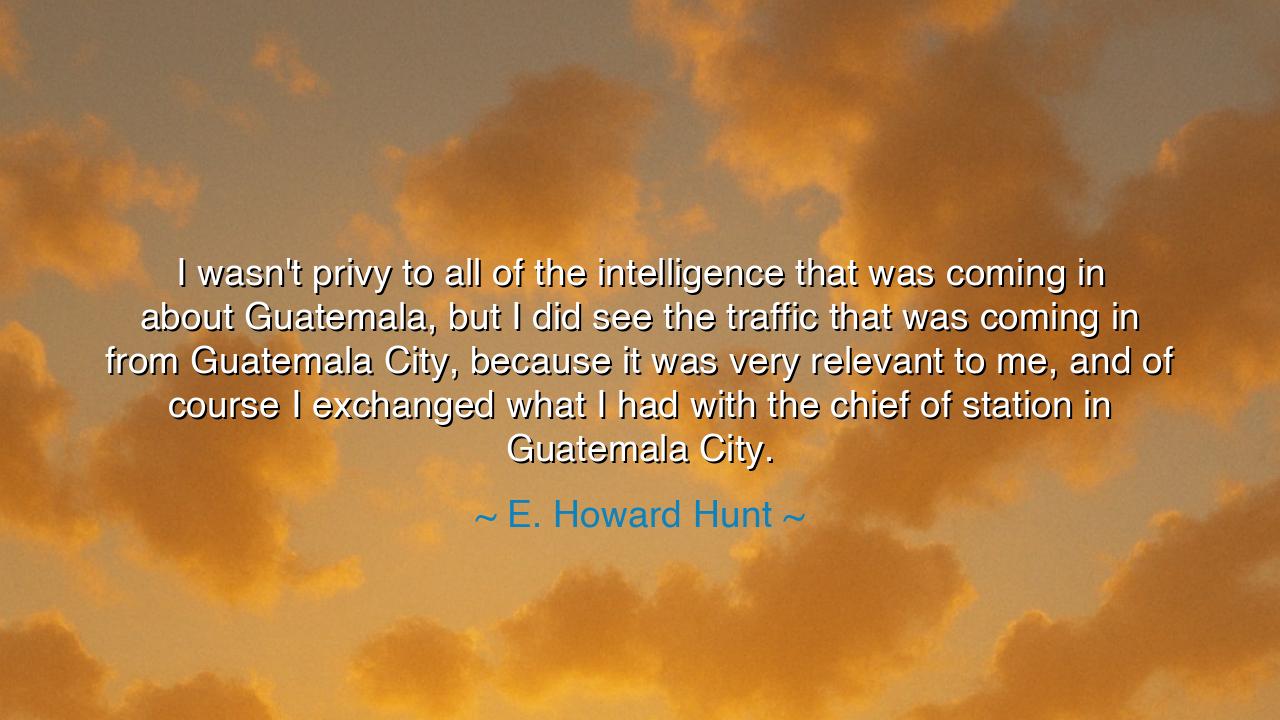
I wasn't privy to all of the intelligence that was coming in
I wasn't privy to all of the intelligence that was coming in about Guatemala, but I did see the traffic that was coming in from Guatemala City, because it was very relevant to me, and of course I exchanged what I had with the chief of station in Guatemala City.






The words of E. Howard Hunt, “I wasn’t privy to all of the intelligence that was coming in about Guatemala, but I did see the traffic that was coming in from Guatemala City, because it was very relevant to me, and of course I exchanged what I had with the chief of station in Guatemala City,” carry the weight of history whispered through the corridors of secrecy. They are not only the recollection of a man bound to the machinery of espionage but a reflection on knowledge, power, and responsibility. Beneath their surface lies a timeless truth: that no single soul can ever grasp the full measure of truth, and that intelligence, like light through a prism, refracts differently in every mind that beholds it.
Spoken by Hunt—an operative of the Central Intelligence Agency during the turbulent mid-twentieth century—these words emerge from the shadowed theater of the Guatemalan coup of 1954, a time when nations played chess with destiny itself. Hunt’s admission of being “not privy to all” reminds us that even those who serve the great engines of power move within the limits of partial knowledge. He saw fragments of truth, streams of information flowing through the wires of Guatemala City, and he acted within that narrow scope, trading what he knew for what others might know better. Thus, he stands as both actor and witness in a drama larger than himself—an emblem of the eternal struggle between the known and the unknown.
In these words lies an ancient echo. For in every empire, from Rome to Babylon, those who wielded influence often did so in fragments of understanding. The Roman general might command legions, but he relied upon scouts who brought tidings from distant frontiers—tidings that could be incomplete, even misleading. And yet, he was forced to decide, to move armies, to seal fates. So it is with all who deal in intelligence—they live in a world of shadows, where truth is half-seen and every act must be taken in faith. Hunt’s reflection becomes not an excuse, but a confession of that burden: that to act without full knowledge is the curse of those entrusted with the destiny of others.
There is also in his words a lesson about communication and trust. “I exchanged what I had,” he says, for even in the labyrinth of secrecy, there can be no progress without exchange—no wisdom without dialogue. The flow of knowledge, like the flow of blood, keeps the body of purpose alive. When one hoards intelligence, believing himself the sole guardian of truth, corruption takes root. But when men share what they know, humbly acknowledging the limits of their sight, they become co-workers in the pursuit of understanding. Thus, Hunt’s act of exchange, though simple, reflects an ancient principle: wisdom grows not from isolation, but from communion.
The story of Guatemala itself is one of light and shadow—of nations acting under the guise of preservation, yet driven by fear and ambition. In this, we glimpse the human condition writ large. For how often do we, too, act upon partial truths, making judgments without the full picture? The heart of this quote transcends politics; it speaks to the humility that all knowledge demands. To admit, as Hunt did, “I was not privy to all,” is to recognize that wisdom is not omniscience—it is the courage to see clearly within one’s limits and to act honorably within them.
Let us, then, take from these words a teaching both practical and profound: do not mistake partial knowledge for the whole truth. Whether in leadership, friendship, or the quiet governance of your own life, remember that no one sees all angles of reality. Listen. Share. Question. Seek counsel. The wise man is not he who claims to know everything, but he who knows that he does not. For only through humility does truth reveal herself, slowly, like dawn breaking over the hills.
And finally, understand this: intelligence without humility becomes arrogance, and arrogance blinds the eye of judgment. The one who learns to exchange what he knows, to listen as much as he speaks, becomes not a mere collector of facts, but a vessel of discernment. So live as Hunt’s words suggest—not with the illusion of omnipotence, but with the awareness that every act of understanding is a shared light in a dark world. In this way, you may become not only a seeker of truth, but a guardian of it—a participant in the grand, unending exchange of wisdom that binds the generations together.






AAdministratorAdministrator
Welcome, honored guests. Please leave a comment, we will respond soon